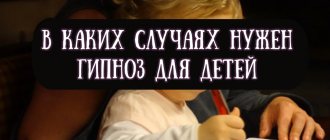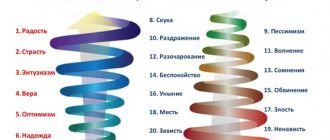- Evaluation criteria for hypnosis courses
- ANO DPO Educational
- Moscow Institute of Psychology and Psychotherapy named after Milton Erickson
- CHU DPO IGiSP
- PI DPO Institute of Practical Psychology "Imaton"
- Moscow Institute of Hypnosis
- "Sinton"
- Educational
- Institute of Clinical Hypnosis
- Siberian Hypnosis Center
- OMNI courses
- Results and conclusions
One of the trends in the treatment of a wide range of diseases has recently become hypnotherapy. Gone are the days when it was associated with television sessions of mass trance induction and loud performances in stadiums given by maestro Kashpirovsky. Today, clinical hypnotherapy is a recognized method in the field of evidence-based medicine, which is gaining more and more popularity in Russia every year.
Let us emphasize that this article is not about circus, variety or street “gypsy” hypnosis. We are talking about hypnotechnicians who are used not for show, but for the treatment of a very specific list of diseases and borderline conditions. Hypnotherapy gives high results in the treatment of not only neuroses, depression and phobias, but also diseases of the gastrointestinal tract and central nervous system. And, of course, she has no equal in solving any psychological problems and getting rid of bad habits, including overeating, smoking and alcoholism. Therefore, many Russian psychotherapists and psychologists are interested in mastering the techniques of therapeutic hypnosis.
It is no secret that in hypnotherapy, the fame of the guru who teaches hypnosis plays a decisive role. Therefore, a number of participants in our review openly abuse aggressive marketing techniques, describing their “gifted from above” person and their “phenomenal” course using the most enthusiastic epithets, which sometimes have no real background. Well, calling the method by its “age-famous” name is generally an indispensable part of the advertising campaign. It is enough to proclaim yourself the new Milton Erickson, pay for the advertising hype befitting the dignity - and voila, the client goes!
Evaluation criteria for hypnosis courses
And even if Wolf Messing himself undertakes to teach you, this is not a guarantee of success. It would seem that the louder the name of the hypnotist, the better he teaches. But this is not always true. And in order to get to the bottom of this truth, we have selected criteria by which one can objectively judge the effectiveness of certain courses in the art of hypnotherapy.
Lifespan
The duration of existence of a training center is one of the most important criteria for judging the popularity of a school and the quality of education. Advertisements for hypnosis courses, which Yandex Direct helpfully slips in, often lead to “sharashkin’s offices” that are almost a week old. A “venerable” hypnotist 25 years old is unlikely to impart valuable practical skills to you.
Teachers, their fame, regalia
Teaching in general and learning the art of hypnosis in particular is not an easy task, and only people of a certain mindset and character can do it. You can be the highest master in hypnosis, but you can be a so-so teacher. Not all famous hypnotists can teach - well, or they do it individually and extremely rarely: for personally selected students.
Practical value of the course
The situation is diametrically opposite to the previous criterion: many specialists are engaged in teaching without having any real practice behind them. Too active teaching activity, put on stream, does not allow the teacher to master the matter himself. It is difficult to expect high learning results from teachers who have rare and irregular practical experience.
Availability of a license for educational activities
This is an indispensable criterion for the quality of education: the right to educational activities in the institution that you choose must be confirmed by a state-issued document. Training in some murky LLC “International Center for Transcendental Hypnosis”, which wanders around the city from one office to another, is not much different in status from apprenticeship with the sorceress Baba Agrafena.
Availability of a state certificate
An offer to pay for your studies, upon completion of which you will receive a colorful piece of paper from an office a la Osya Bender and Company, should make you smile sarcasticly. Agree only to an official certificate giving you the right to use hypnotherapy methods in your practice.
Online availability
A big advantage will be the availability of online courses - distance learning is both cheaper and more convenient for those who do not have the opportunity to study in person. Let’s also take into account such indirect evidence of the school’s fame as developed groups in popular social networks - this is also confirmation of feedback from graduates or potential students.
Value for money
This is one of the most important criteria. Expensive in hypnotherapy does not mean effective. But even frankly cheap offers look suspicious.
So, we begin our review of the ten most famous hypnotherapy training courses, rating them in light of the listed criteria on a scale of 10. We hope this rating will help you make the right choice for your professional growth!
Why choose this course
The author's course of hypnotherapy by Danilov V.A. has unique differences.
- Training in the most effective (Russian and foreign) techniques.
- 6 days of training, and the result will not be long in coming. You will gain valuable knowledge and be able to apply it in practice with confidence.
- Teaching a systematic approach - students can use many techniques to treat different diseases.
- Your understanding of hypnotherapy will become deeper and more holistic. Patients will trust you. After training, creating session plans will no longer seem difficult.
- Take into account the unique author's developments and increase the effectiveness of the sessions.
There are no advertisements, long stories about yourself, idle talk or other unnecessary information in the classes. You will learn what real, classic hypnosis is and learn effective practical application. Value your time and sign up for a 6-day course.
ANO DPO Educational
- Website: https://bormentalkurs.ru/hypnosis2/
- Address: St. Petersburg, st. Varshavskaya, 23, building 2, room 25-N
- Telephone:
- Email:
- License: 78Л03 No. 002471
This training center for additional professional education has existed since 2001. However, for many years he worked only for internal training of psychotherapists, and only a few lucky ones were able to get into training courses from outside. Bormental specialists were the first in Russia to use hypnotherapy in the fight against food addiction among the general population: this method has been used for two decades in more than 50 branches of the clinic throughout the country.
Bormental has enormous practical experience—the most impressive among the review participants. Over the 20-year history of the clinic, more than 500 thousand people have used its services, and accordingly, treatment through the method of clinical hypnotherapy, which is confirmed by a certificate from an international rating agency. Bormental's official groups on popular social networks number tens of thousands of subscribers (Odnoklassniki - more than 43 thousand, VKontakte - more than 45 thousand).
The courses are conducted by a team of hypnologists of various profiles and specializations, led by psychotherapist, candidate of medical sciences, associate professor of the medical faculty of St. Petersburg State University Andrey Bobrovsky. Dr. Bobrovsky is known throughout the country, being the author of a number of popular science books and a regular expert on top programs on federal channels: “I’m losing weight!” on NTV, “Health” with Elena Malysheva, “Test Purchase” on “Pervoy”, etc.
The training program includes hypnosis techniques that are effective both in individual psychotherapy and when working with a group, and the methods of their use are thoroughly practiced. Upon completion of the courses, a state-issued certificate is issued. Moreover, since it is the clinical base of the Faculty of Medicine of St. Petersburg State University, students are issued a certificate from this university - one of the most respected higher educational institutions in Russia.
Courses are taught both face-to-face and online. The most important feature of online courses is the use of a distance learning service for teaching, which is radically different from standard webinars with a “talking head” effect or communication on Skype. Feedback learning allows you to virtually blur the line between distance and face-to-face learning.
The cost of online courses is from 17,000 rubles. The cost of full-time courses is from 25,000 rubles.
pros
- The courses are conducted by a team of media-famous specialists.
- Teaching hypnotherapy is based on enormous practical experience.
- Detailed and interesting course program.
- Students are issued a certificate of the St. Petersburg State University.
- Convenient online platform for learning.
Minuses
- Courses are held rarely.
Scores based on criteria
| Lifespan | Teachers, their fame, regalia | Practical value of the course | Availability of a license | Availability of certificate | Online availability | Value for money |
| 10 | 10 | 10 | 10 | 10 | 8 | 10 |
Hypnosis for learning a foreign language. Summing up the project.
There has already been a short article on the topic of using hypnosis for learning foreign languages (can be read here ). I will not duplicate what is already written there. Let me just remind you that my solution to this problem, although original, is not the only one.
Below are a few remarks regarding stereotypes and expectations.
Mythology
There are three main myths regarding the use of hypnosis to learn a foreign language.
Myth 1. Secret developments of the KGB
Oh yeah! These dangerous top-secret developments of the special services, which turn any person into a simultaneous interpreter, a polyglot in the shortest possible time! )))…
From time to time, when people contact me about using hypnosis to learn a language, a conspiracy theory question arises. They say that there are secret developments of the special services, and learning a language under hypnosis is the secrets of the KGB. Moreover, even teachers talk about this, supposedly knowing exactly about such great witchcraft. Coincidence? Don't think!
I immediately remember all sorts of strange NTV, TNT and RENT TV films, about all sorts of secret service themes, reptilians and other “intrigues, scandals, investigations.” For all their trashiness, they form magical thinking and an inadequate attitude of people, including towards hypnosis. This also includes fakes about frame 25 using the “Ilona Davydova method”... on the one hand. On the other hand, good science fiction comes to mind from the authors Isaac Asimov, Robert Heinlein, or Ivan Efremov, who were very interested in hypnotism and in their novels put it into service with scientists and armies of the future... but this is mostly romance, although and interesting to implement. )))
Indeed, the special services used (perhaps still use, which is doubtful) hypnosis in their training. I myself met veterans who even told how this happened and even specialists who were involved in the implementation of such technologies. And, it must be said that, contrary to expectations, the technical arsenal and level of the specialists there turned out to be very limited and very unidirectional. Which is understandable: with strict standardization requirements and highly specialized approaches.
Training was usually carried out, for example, among GRU troops with signalmen and was reduced to preliminary motivating direct suggestions on language perception. This in itself already gives results and adjusts attention. There are no particularly secret techniques in this. There are no special technological moves here either. This is quite easy to do without hypnosis! In conditions of drill training, direct suggestions can be driven into the subcortex no less effectively. )))
Myth 2. In hypnosis a person can spontaneously learn a language.
This myth also includes the myth that a person can remember the language from past lives!
This hoax is a consequence of several metaphysical ideas known since antiquity, as well as hoaxes inherited from alchemy and magic about the use of mediums to merge with the Anima Mundi (world soul, now names like “Akashic Chronicles” or “Unified Mind” are more common, in general “A universal knowledge base to which a person connects”). Suffice it to recall John Dee with his Enochian language, or one of the signs of “possession”, when a person (with a dissociative disorder) begins to speak in “unknown languages”, or, closer to modern times, when sectarians from “charismatics” or “Pentecostals” under “by grace” they speak the “language of angels” or begin to channel the “Voice of the Lord” through themselves and prophesy (also an effect of dissociative disorder).
You can also recall characters from paranormal television programs, such as Tati Vallo and Willie Melnikov, with their spontaneous awakening of the “gift of polyglotism.” I don’t know how true their stories are; personally, I see typical myth-making, with an old but modernized plot. The explanation for such cases is more prosaic, and the phenomena behind them were well understood back in the 19th century during the systematic study of both the issues of psychism and spiritualism, and the distortion of the work of consciousness in disorders of the central nervous system.
However, hypnosis does sometimes create the effect of spontaneous hypermnesia, when a person can remember a language that he has not used for decades, or reproduce real languages that he simply heard in childhood. This facet of hypermnesia was quite widely studied by classics also at the end of the 19th century (see, for example, M. Shoifet, “The Unsolved Secrets of Hypnosis”). But such cases, especially spontaneous ones, are rather isolated and do not occur systematically, although they have occurred in my practice.
Myth 3. Language learning under hypnosis (about hypnopedia)
That is, what is meant here is that a person is drilled into the English language program in a standard way, but when he is in hypnosis...
Hypnosis actually makes a person more receptive to any kind of learning. And with the help of hypnosis, this very process can be seriously accelerated and optimized. But the state of hypnosis itself with standard training programs most often does not live up to expectations. In addition, when there is no optimization of the material for the perception of a particular person and he is not placed in specific conditions, such as the army, where he is constantly within the framework of a “combat unit” without any choice (back to the myth about the KGB). Such methods can have a canceling effect on learning.
An example of such a passive approach to learning is the attempt to widely introduce the so-called “hypnopaedia”, that is, learning in a dream. What seemed like a wonderful idea turned out to be an absolute failure! But even now there are rumors that in order to quickly learn a foreign language, you need to put a person into hypnosis, “give him a memorization setting” and turn on a speaker. ))) This is a typical lack of understanding of how human memory works and skills are formed. The mechanistic approach of rote learning to build effective skills or even long-term memory does not work! And it doesn’t matter whether a person is in hypnosis or in an alert state. You should always remember that a person is not a robot, and his brain does not work like a computer into which you can simply “download information.”
I have heard a lot of talk about the effectiveness of such methods, but I have never seen any decent effects. Moreover, I know those who actually tried to repeat this as an experiment and did not achieve success, to which the “authorities” declared an “underload.” In practice, attempts to passively use hypnosis almost never give the desired result. There may be exceptions, but they are rather exceptions.
However, hypnopedia can work within certain limits, but this requires preliminary preparation. And it does not work so straightforwardly, and does not carry the potential of a self-sufficient tool for “fast learning,” but can be used as an auxiliary tool for collecting information and systematizing it, but not at all for building skills.
***
Such hoaxes are only good for creating an aura of exclusivity, and have little relation to real technologies. But if people like it, why disappoint them?! )))
It’s time to move on to the example of a technology I created and standardized (hypnosystem) to optimize the skill of teaching foreign languages.
Demonstration video application for the author's methodology.
Now, from mythology and stereotypes, I’ll move on to the author’s decision, which I recently intended to demonstrate in video materials of a higher quality than those that remained from the time of development.
This author's technique is six years old. And all these six years, the hypnosystem and the approach itself have been systematically used and supplemented. The videos demonstrate individual and standardized (for working with a group) options for solving the problem of using hypnosis to optimize further independent language learning.
Features of the author's method
The basis of the author’s methodology that I propose is the optimization of the learning process, getting rid of errors that form the basis of “standard methods” of teaching languages, optimally tuning attention to obtain the effect of “immersion in the language” and the formation of basic thinking skills in a foreign language. In addition, the method includes heuristics (solutions) that ensure the formation of a systematic approach to the study of foreign languages.
Ultimately, the basic skill of optimal language learning is formed, which includes optimization of memory and attention, a “sense of language” as a form of intuitive approach, as well as the ability to systematize the syntactic features of the language. All this ensures optimal self-learning.
Features of an individual approach
An individual approach implies an emphasis on a person’s individuality (which is quite logical))). This approach makes sense when there is a developed aversion to learning languages, thanks to studying at school or somewhere else. Here, additional emphasis is placed on correcting motivation and getting rid of individual internal contradictions.
The disadvantage of this approach is the transfer of consolidation of the skill within the framework of group dynamics to independent “homework”, although all the necessary conditions are created for this.
Features of the group approach
In the case of a group approach, all moves are more standardized and it is not always possible to pay due attention to the individuality of the participant. But the advantage of working with a group is a more effective development of basic speaking skills and assessment and consolidation of work in group dynamics.
Of course, the optimal approach is a combination of group and individual work.
Look:
Remark on professional ethics #10. About domestic and American hypnotherapy.
Moscow Institute of Psychology and Psychotherapy named after Milton Erickson
- Website: https://gordeev.ru/
- Address: Moscow, st. Novolesnaya, 6B, building 1
- Phones:, 8 (985) 191-30-00
- Email:
- License: №039488
Despite the apparent “youth” from the name, the institute was founded back in 1992 and reformatted to a modern educational format in 2014. Its creator and director, psychiatrist-psychotherapist and clinical psychologist, Doctor of Medical Sciences, Professor Mikhail Nikolaevich Gordeev, is a teacher with almost 25 years of experience and wide popularity throughout Russia. The activities of this particular scientist in the 90s of the last century led to the popularization of Ericksonian hypnosis in our country. Therefore, it is not surprising that the Erickson Foundation (USA) signed a partnership agreement with Professor Gordeev.
The hypnotherapy training program includes a basic course of Ericksonian hypnosis and Ericksonian psychotherapy in two parts, self-hypnosis and techniques for quickly inducing trance. Upon completion, a certificate of advanced training is issued in accordance with the Law “On Education” of the Russian Federation. Communication with the institute is maintained through the website and groups on social networks, although there are few subscribers (on VK - 2,771 people, on Instagram - just over 2 thousand).
Courses are conducted face-to-face and online. The cost of the 8-day course is 42,000 rubles, it is possible to get a 20% discount.
pros
- The teacher is a specialist with a big name and enormous authority.
- The Institute is a representative office of the famous American Foundation for Non-Directive Hypnosis.
Minuses
- A meager descriptive part of the hypnosis training program.
- High price.
Scores based on criteria
| Lifespan | Teachers, their fame, regalia | Practical value of the course | Availability of a license | Availability of certificate | Online availability | Value for money |
| 10 | 10 | 9 | 10 | 9 | 7 | 7 |
Hypnosis contraindications
Classic directive hypnosis has a number of contraindications and can cause complications, negatively affecting the human psyche. In some cases, when the individual characteristics of the hypnotized were not taken into account, the hypnosis sessions ended sadly for them. Most often this happened during public hypnosis sessions, when volunteers were called from the audience, without any preliminary conversation or diagnosis.
Possible complications of hypnosis include a hysterical attack, the so-called hysterical hypnosis and spontaneous somnambulism. During the session, a complication is possible with a sudden transition of hypnosis into a hysterical attack with violent behavior (screaming, sobbing, convulsions) or stupor, as well as a twilight disorder of consciousness. This state must be immediately and directly stopped by the hypnotist, after which the ward is brought out of the trance. If necessary, you can give him a glass of water as a sedative.
With spontaneous somnambulism, the patient’s rapport with the hypnologist is suddenly lost. A somnambulistic state occurs, accompanied by hallucinations and complex forms of behavior: for example, the subject gets up, walks, communicates with imaginary people, plays out real or imaginary scenes from life.
There were also cases of development after a hypnosis session of a dissociative state, derealization, depersonalization, regressive (childish) behavior, the appearance of headache, nausea, dizziness, drowsiness, depression, episodic psychotic decompensation and spontaneous trance. Also, some patients experienced feelings of inexplicable fear, shame, increased fatigue, confusion, uncontrollable hysterical crying, and even the development of PTSD (post-traumatic stress disorder). A case is described of a patient being diagnosed with schizophrenia after a session of public hypnosis (however, it is impossible to make an unambiguous conclusion that the development of the disease was provoked by a hypnotic session; it was probably an unfortunate coincidence; hypnosis only caused an exacerbation of an already developing disease).
With hypnosis performed in a clinical setting, only minor complications were observed in the form of stiffness and weakness of the limbs, drowsiness, dizziness and headaches.
- MacHovec divides the risk factors leading to complications with hypnosis into 3 groups: those related to the patient himself, the hypnotherapist and the environment. Risk factors on the part of the hypnotist include his unprofessionalism, lack of experience and knowledge, personal factors - religious and ethical preferences, various addictions (alcohol, drugs). From the patient’s perspective, this includes family and personal history, physical and mental state at the time of the session.
Contraindications for hypnosis are:
- state of intoxication (drug or alcohol), as well as taking any tranquilizers, antidepressants, antipsychotics and sedatives;
- fractures, dislocations and other injuries that temporarily limit habitual movements;
- intellectual disorders, mental retardation;
- affective insanity;
- paranoid syndromes with brain damage;
- epileptic, convulsive seizures;
- cardiovascular failure;
- asthma.
At the moment, the following approach applies to classical hypnosis: use it for treatment only in cases where it is really necessary and the effectiveness of its use outweighs the possible risk. In all other cases, it is recommended to use other methods of influence.
CHU DPO IGiSP
- Website: https://www.igisp.ru/
- Address: Moscow, st. Pokrovka, 31, building 2, entrance 6
- Phones:, +7 495 917-80-28
- Email:
- License №036277
The Institute of Group and Family Psychology and Psychotherapy is a private commercial organization of additional professional education, one of the oldest in our review. It was on the basis of IGiSP back in 1992 that the first trainings in Russia were held for foreign masters of clinical hypnosis - Ernest Rossi, Jean Becchio, Norman Wooton and others.
The teacher of the courses we are interested in is one of the masters of Russian hypnotherapy. This is Doctor of Psychology, Professor Mikhail Romanovich Ginzburg, who has been teaching Ericksonian hypnosis for almost 15 years. The book publishing activity of this outstanding hypnologist is respectable: in collaboration with Evgenia Yakovleva, he published the popular science book “Ericksonian Hypnosis: A Systematic Course,” based on the materials of his own trainings.
The programs last long enough for students to fully master the art of hypnosis. However, in the educational programs on hypnotherapy available on the IGiSP website, there is no training in non-Ericksonian methods, which in a certain way narrows the knowledge students receive.
Upon completion of training, IGiSP issues a company certificate. The cost of the most affordable courses is from 60 thousand rubles.
Strange as it may seem against the backdrop of the authoritative teaching and solid experience of IGSP, the institute’s representation on social networks is very low: for example, in the VK group there are only 300 participants and 3 messages for 2022.
pros
- IGiSP is the founder of teaching clinical hypnosis in Russia.
- The course leader is one of the most famous teachers of Ericksonian hypnosis.
- Long-term programs that meet the standards of foreign schools of clinical hypnosis.
Minuses
- There is no distance learning option.
- In-person compact courses and VIP programs are conducted quite rarely, in small group format, and often enrollment in programs stops long before the start of training.
- There is no training in other types of hypnosis other than Ericksonian.
- High price.
- An outdated website and lack of activity on social networks make it difficult to communicate with course graduates.
Scores based on criteria
| Lifespan | Teachers, their fame, regalia | Practical value of the course | Availability of a license | Availability of certificate | Online availability | Value for money |
| 10 | 10 | 9 | 10 | 10 | 1 | 7 |
PI DPO Institute of Practical Psychology "Imaton"
- Website: https://www.imaton.ru/
- Address: St. Petersburg, Smolenka River Embankment, 14A, office 124
- Telephone:
- Email:
- License: №1652
"Imaton" is one of the oldest non-state educational centers in St. Petersburg. This private institution of additional professional education in the field of psychology and psychotherapy was founded in 1998.
Hypnosis is taught here by Elena Borisovna Kuleva, Candidate of Psychological Sciences, teacher at the Department of Social Management at the St. Petersburg State University of Service and Economics. The information about teachers published on the Imaton website indicates numerous seminars that Elena Borisovna attended, but not a word is said where and when she studied classical and Ericksonian hypnosis.
The program of the training seminar, frankly speaking, is not rich: the duration is only 24 hours. Its content is described very briefly and concisely, but it was not possible to find reviews from course participants on social networks (Instagram and VK). However, the authority of Imaton, which has been raising the professional level of psychotherapists and psychologists for three decades, is unshakable!
pros
- A well-known school, one of the oldest private centers for teaching psychology in Russia.
- The certificates issued by the institute are in well-deserved demand in the labor market.
Minuses
- A little-known teacher who has not proven himself in the field of hypnotherapy.
- The program is very short and outlined in general terms.
- No distance learning.
Scores based on criteria
| Lifespan | Teachers, their fame, regalia | Practical value of the course | Availability of a license | Availability of certificate | Online availability | Value for money |
| 10 | 5 | 8 | 10 | 10 | 8 | 8 |
Moscow Institute of Hypnosis
- Website: https://institutgipnoza.ru/
- Address: Moscow, Leninsky Prospekt, 29 building 2
- Telephone:
On its website, the institute proudly presents itself as the Russian leader in hypnosis training, focusing on a large number of graduates per year. It is difficult to verify the accuracy of the data, but let's figure it out. Firstly, it was not possible to find the history of this institution in available sources and establish the duration of its existence. Secondly, the staff of teachers is solid only at first glance. There is only one hypnologist with an academic degree here - frankly speaking, this is not enough for the “institute”. And if you read the teachers’ resumes, it turns out that only two specialists have a medical education. For the “Russian leader of therapeutic hypnotherapy” this is more than frivolous.
Further - more: in the Unified State Register of Legal Entities information about an educational license, this organization does not have any information. The name of the institute itself is nothing more than a beautiful sign behind which hides a private enterprise, registered, according to the Unified State Register of Legal Entities, at the address: st. Pokrovka, house 14/2, room 3. That is, the registration of the institute in one of the small rooms of the office center does not coincide with the address where it actually conducts its work. Most likely, this explains the lack of a license for educational activities: it is issued only at the registered address of the enterprise. Thus, this LLC has nothing to do with state academic education. Accordingly, state-issued certificates are not issued here, so the satisfied graduates pictured on the “landing” page of the site most likely have just fake pieces of paper in their hands.
And yet, the authority of Doctor of Medical Sciences Boris Grigorievich Afanasyev, who has been practicing hypnosis for more than 40 years, is high enough to interest those who want to learn his skills. However, with all due respect to the teacher, the role of the “living legend of hypnosis” and “the most eminent hypnologist in Russia” - and this is how he is presented on the site - is matched by a specialist who writes scientific articles and books, has patents for inventions, well, for at worst, cited in the works of other scientists. We did not find any of the above in Afanasyev’s “professional piggy bank”. So let’s take the self-proclaimed status of a “living legend” with a certain amount of skepticism.
The complete absence of accounts for this organization on Facebook, VKontakte and Instagram is surprising. The only social network - the YouTube channel - has not been updated for more than a year.
Considering all of the above, the prices here are simply ungodly - from 39,200 to 60,000 rubles per course.
pros
- Various areas of hypnosis training courses, detailed schedule.
- The director is a hypnologist with 40 years of experience.
Minuses
- There is no license for educational activities.
- Behind the spectacular name lies an ordinary LLC.
- No distance learning.
- Lack of groups on social networks.
- Unreasonably high cost.
Scores based on criteria
| Lifespan | Teachers, their fame, regalia | Practical value of the course | Availability of a license | Availability of certificate | Online availability | Value for money |
| 5 | 9 | 8 | 5 | 6 | 3 | 5 |
What happens to a person in a dream and under hypnosis
According to the theory of I.P. Pavlov, sleep is a spreading inhibition of neurons in the cerebral cortex. There are two types of sleep: the so-called normal or slow-wave sleep and rapid or paradoxical sleep, during which the sleeper dreams. The EEG of the brain in the REM sleep phase practically corresponds to the EEG of a waking person, which is why it is called “paradoxical”. The brain should be asleep, but it is awake. Between these two states, as well as the transition from wakefulness to sleep, there is a whole range of transitions - the so-called phase or hypnotic states. Is hypnotic sleep identical to natural sleep? Many researchers believe that yes, but the EEG indicators in both cases are different. In addition, there was significant fatigue in the subjects after the hypnosis session, which was not the case after normal sleep.
During normal sleep, the sleeper experiences selective sensitivity to various stimuli. What remains is the so-called guard point or “rapport” for communication with the outside world. This was supposed to be used for sleep learning through suggestion.
According to research, rapport can be created by the hypnotist's voice if, when falling asleep, a connection with it is maintained and, through speech or other means, the setting is given to remember the speech during sleep. “Sleep peacefully, don’t wake up... in the morning you will remember everything...” It turned out that speech in this case can be remembered, in actual or latent form.
Svyadoshch A.M., one of the first Russian researchers of the possibility of learning in a dream, noted that sleepers are not aware of the process of speech perception. It is perceived as thoughts that spontaneously came to mind, or as part of the plot of a dream. However, not every speech perceived in a dream is remembered. For this to happen, a response impulse must be received from the reticular formation to a signal received through a nonspecific pathway from the sensory organs. This usually occurs while awake, but during sleep the signal becomes isolated.
The famous Russian hypnologist G.I. Platonov noted the differences between the rapport created by the hypnotist and the guard point. The duty station is isolated from other areas of the cerebral cortex, but rapport can be associated with any of them, in addition, its specificity can be influenced by the personality of the hypnotist. Memorization during natural sleep and under hypnosis has different mechanisms, since in the second case post-hypnotic suggestion takes place.
"Sinton"
- Website: https://www.syntone-spb.ru/
- Address: St. Petersburg, Petrogradskaya metro station, Aptekarsky Prospekt, 6A , NPO Radar building
- Phones:, +7 812 944-40-80
- Email:
Sinton is a training center with branches in a number of Russian cities that has existed for more than 25 years. It was founded by the famous Moscow psychologist, author of a number of popular books, Professor Nikolai Ivanovich Kozlov.
Most of Sinton's trainings are devoted to practical psychology. Training in the “Eriksonian hypnosis” program is conducted here by Anton Bezmolitvenny, a psychologist, candidate of philosophical sciences. He is quite famous as a personal growth coach and the author of popular philosophical novels.
The proposed hypnosis training program is limited exclusively to the Ericksonian approach. But the main catch is that the license for educational activities is not listed on the website. And although potential listeners are assured that they will be awarded a certificate, it will probably only be useful for hanging it in a frame on the wall at home and quietly admiring it. It is unlikely to be suitable for legal practice within the walls of some reputable medical institution.
The cost of the full course with a discount is 43,000 rubles.
pros
- A wide variety of short and long-term training programs.
- Availability of webinars.
Minuses
- The teacher does not have a medical education.
- There is no license for educational activities.
- The certificates do not comply with the state standard.
Scores based on criteria
| Lifespan | Teachers, their fame, regalia | Practical value of the course | Availability of a license | Availability of certificate | Online availability | Value for money |
| 9 | 6 | 7 | 5 | 6 | 8 | 7 |
Educational
- Website: https://psy.education/
- Address: St. Petersburg, Kamennoostrovsky prospect, 40, office. 410
- Telephone:
- License: №025784912
On the website of this center there is no information about its creators: only the laconic “we” - as if that says it all. In one block on the website this institution is called “Educational”, in another - “Limited Liability Company “Training Center named after. N.P. Bekhtereva." But don’t be fooled by the loud name: to the famous “Institute of the Human Brain named after. N.P. Bekhtereva RAS” is an LLC registered in a small room in one of the business centers, has no connection. The address indicated on the website does not match the address at which the license for educational activities was issued. Based on the scant information on the website, it can be assumed that this educational institution was created just a couple of years ago.
However, the teaching staff here is very authoritative. Clinical hypnosis is taught by Swedish psychotherapist Suzanne Carolusson. The program is long-term, two years, accredited by the European Society of Hypnosis ESH. We can only hope that the leapfrog with licenses, addresses and names does not prevent respected teachers from “sowing the reasonable, the good, the eternal.”
The social networks of this institution do not shine with activity: one message is published on Instagram every six months, on VK - 1-2 messages per month. In the same VK, only 259 people are subscribed to the group: such a small number does not inspire confidence.
The cost of the four-day course is 25 thousand rubles. In-person attendance in all six modules is required.
pros
- Foreign teacher accredited by the European Society of Hypnosis.
- Long-term full-time training program.
Minuses
- No distance learning.
- Teaching is conducted only in English, so translation is required for those who do not speak it perfectly.
- Poor program topics.
- Abuse of aggressive marketing techniques on the site: in relation to little-known psychologists and their techniques, loud phrases such as “#1 experts in Russia” and “the only technique in Russia” are used.
Scores based on criteria
| Lifespan | Teachers, their fame, regalia | Practical value of the course | Availability of a license | Availability of certificate | Online availability | Value for money |
| 3 | 10 | 8 | 10 | 7 | 7 | 7 |
Institute of Clinical Hypnosis
- Website: https://rushypnosis.ru/
- Telephone:
- Email:
Founded, according to information on the website, in 2005, this organization makes a very strange impression: an altered state of consciousness begins immediately upon becoming acquainted with the contents of the site. It seems that the loud name “Research Institute of Clinical Hypnosis (Research Institute of Clinical Hypnosis) of the National Society of Hypnosis of the Russian Federation” is nothing more than a marketing gimmick. Judge for yourself: no address, no legal form, no license number for educational activities! Well, more precisely, the license is posted on the website, but it belongs to the St. Petersburg National Medical Research Center for PN named after. V. M. Bekhtereva. This is a reputable government institution, on whose website there is no information about the “institute” in question: perhaps they don’t even realize that someone is shamelessly using their license. In general, complete paradoxes: the hypnotic institute has a license from a research institute from St. Petersburg, the phone number is Moscow, but there is no address at all! Yes, there are more questions than answers regarding this organization.
It would seem that everything is more or less clear with the teaching staff. However, there’s a catch! The website contains a list of teachers and a list of staff - and try to guess how they differ from each other! The teachers include psychologists who are not burdened with academic degrees and positions, with the exception of the undisputed master of Soviet hypnology - Vitaly Grigorievich Yevtushenko. However, the venerable teacher actually lives in distant Kharkov, and on his website not a word is said about the vigorous activity at the Institute of Clinical Hypnosis. Yevtushenko is also not listed in the schedule of the Institute’s upcoming seminars.
The list of employees includes two medical psychologists, two psychotherapists and - I can’t believe my eyes! - famous foreign hypnotherapist Jean Becchio, honorary president of the French Association of Hypnosis. But all the participation of the famous hypnologist comes down to posting a link on the website about his seminar in France. They say, go and visit Jean - and you will be happy! But again there is a problem: on Jean Becchio’s website nothing is said about the great honor of being included in the staff of the Institute of Clinical Hypnosis from Russia. But let’s no longer bore readers with an investigation of all the intricacies of this incomprehensible organization, but let’s move on to considering its trainings.
The website contains an offer for specialization in medical hypnosis in the clinic of psychosomatic disorders and internal diseases. There are two teachers on the course, both without medical education - psychologist, candidate of psychological sciences, associate professor of the department of acmeology and psychology of professional activity at RANEPA Alexander Nikolaevich Blinkov and simply psychologist Sergei Aleksandrovich Bolsun. The course program is described extremely briefly, however, it includes techniques from Dovzhenko, Erickson, Rossi, and Becchio. All those who successfully complete the training are promised a state diploma.
Activity on social networks is ridiculously low: over the past year, five posts on Facebook and two on Vkontakte.
But you can’t look at the prices without tears: the cost of a full course of study is 120 thousand rubles. Payment can be made in installments: 40 thousand rubles for each weekly cycle.
pros
- Affiliation with well-known educational institutions and professional communities.
- Various programs.
- Interesting articles and books posted on the site are freely available.
Minuses
- Sparse and formal descriptions of curriculum.
- Confusion with the legal form.
- No online training.
- Low activity on social networks.
Scores based on criteria
| Lifespan | Teachers, their fame, regalia | Practical value of the course | Availability of a license | Availability of certificate | Online availability | Value for money |
| 10 | 9 | 8 | 8 | 10 | 5 | 8 |
Duration of the entire program
days
hours
steps
All classes are held in a friendly and creative atmosphere, in a comfortable and spacious hall, with delicious coffee breaks and communication with interesting people. This is a unique and most effective opportunity to master complex hypnotic techniques, gain your therapeutic experience and resolve your problems. You will learn to manage yourself and others, and significantly increase your potential.
Upon completion of the full course of study and successful passing of the qualifying exam, students receive state diplomas.
Module
40000₽
month
- Suitable for completing one module.
- Apply now
- Duration 8 days
- 1 module
- Certificate of completion
Sign up for training
-10%
Program
180000₽
5 months
- Suitable for completing the entire program.
- Apply now
- Duration 40 days
- 5 modules
- Diploma after passing the exam
Sign up for training
-10%
Program
144000₽
4 months
- Suitable for completing a 4-module program.
- Apply now
- Duration 32 days
- 4 module
- Diploma after passing the exam
Sign up for training
Pre-registration is required! By submitting an application, you reserve your place in the group - we will contact you and keep you informed of all the news, place and time of the seminar.
The proposed material forms a deep understanding of the structure of trance and the basic principles of the functioning of the human psyche. The course covers the views of Eastern and Western philosophical movements on the problem of interaction between consciousness and the unconscious.
Kuznetsov Denis Vladimirovichpsychologist of the highest category, hypnotherapist, medical psychologist - HypnoLIFE
The most complete course
from beginner to advanced level
250+ hours
gold standard in hypnosis training
State diploma
retraining or advanced training
Individual approach
training in mini-groups up to 20 people
Special offer! 10% discount on training until the end of the month. Sign up for an interview
Siberian Hypnosis Center
- Website: https://centergipnoza.ru/
- Phones: +7 3822 300-268, +7 913 116-11-95
- Email:
The Siberian Hypnosis Center began its activities in the early 2000s. Judging by the website, it is a team of only four people, which does not prevent it from being loudly called “the largest organization in Siberia engaged in organizing and conducting training programs on hypnosis and hypnotherapy.” The head of the center, Mikhail Aleksandrovich Kopytov, presents himself as “a hypnologist, one of the leading specialists in Siberia,” although he is trained as a chemical technologist and his PhD thesis is also from this field. Judging by his words, he received his psychological education in absentia, but his interest in hypnosis led him to a new path, which was realized, among other things, in writing a popular book on self-hypnosis. Three other psychologists have neither scientific degrees or titles, nor teaching experience in reputable educational institutions.
The center offers a number of training programs on hypnosis and self-hypnosis, but the license for educational activities is not listed on the website. In addition, these trainings are proprietary, which means they are more suitable for self-development than for official medical practice. The certificate is also issued “company”, and not state.
However, it deserves respect that this organization is one of the few that persistently promotes hypnotherapy and hypnosis training in the Siberian region. The popularity of the center is evidenced by the considerable number of subscribers to its VKontakte group (by the way, very active): about 7 thousand people.
Training prices range from 9,500 rubles for a 3-day course in Siberian cities to 63,000 rubles for a 10-day field school in Altai.
pros
- Active educational activities in different cities of Siberia and Kazakhstan.
- Regular online webinars.
- Developed groups in social networks with relevant content.
Minuses
- “Siberian organization, without a legal address and educational license.
- The head of the hypnosis center does not have a medical education, and his title “one of the leading specialists in hypnosis in Siberia” has not been confirmed in any way.
- Lack of state certificates.
- Unjustifiably high prices for training from “enthusiasts”.
Scores based on criteria
| Lifespan | Teachers, their fame, regalia | Practical value of the course | Availability of a license | Availability of certificate | Online availability | Value for money |
| 7 | 7 | 6 | 2 | 3 | 9 | 6 |
Student reviews
Review by Svetlana
Thank you for the training you provided. I will be forever blessed...
Review by Vladimir
I have spent many hundreds of hours in hypnotherapy classes at...
Maria's review
Everything I needed to learn for my practice was provided...
Review by Anastasia
I highly recommend you as an exceptional school for...
Anna's review
After I completed the 100 hour hypnotherapy program...
OMNI courses
- Website: hypnosis training.moscow
- Phone: +7 (96seven) 00-ZERO ZERO-123 (Andrey) What's App
No, this is by no means a typo or a prank, but authentic contacts of a hypnologist trainer, copied from his website. The narrative on this site is replete with standard aggressive marketing techniques: “The most comprehensive program on the training market,” “Some of the largest courses in the world,” “Don’t confuse us with the many clones and copies of the course.” The text is replete with epithets “first in the world”, “largest”, “oldest”, “exclusive”, etc. Just these tired moves from the practice of direct sales cause caution. Further - more: the only leader of the course, psychiatrist and psychotherapist Andrei Vladimirovich Efremov, is presented as the head of the department of practical psychology, psychodiagnostics and hypnoanalysis at the ANO DPO "International Social and Humanitarian Institute". Now find this institute on Yandex maps, and it will become clear to you why the contact information indicates a personal and not a corporate e-mail. However, it can be assumed that the venerable doctor is fond of marketing techniques due to the costs of his profession.
The rabid criticism of competing organizations and areas of psychotherapy also attracts attention: “Eriksonovka is hopelessly outdated,” “How many thousands of psychologists do universities graduate per year in the Russian Federation? Who did they help? and similar statements emphasizing the exceptional genius of the presenter. However, professionals who are confident in their abilities do not blame their colleagues for low efficiency so dismissively, and most importantly, without evidence.
But this cup has not passed over the potential cadets either! “20% of those trying to get onto the course are psychopaths, sociopaths, schizophrenics, etc.,” this “serious teacher” categorically states on his website. Then he confidentially adds: “Therefore, the address of the training is communicated only to those who have paid” - and immediately there follows an offer to transfer a certain amount. Well, you can’t so openly take people for suckers! Or does a respected psychiatrist diagnose patients based on whether they pay him or not? Such a derogatory and rollicking attitude towards colleagues and students, to put it mildly, raises concerns for the mental health of the guru himself.
In Russia, the course has only recently existed, but its analogues have been held abroad since 1979. I couldn’t get acquainted with the training program on the website: they say it’s a secret! To find out what exactly is included in the course, you need - neither more nor less - to share your personal data. This “intriguing” move is generally beyond the bounds of not only reason, but also the law. One thing is reliably promised: “full-fledged demonstrations of healings directly on students.” In light of all of the above, this prospect sounds scary. It’s a consolation that at least diplomas are issued according to state standards. At the same time, you can become the owner of a clinical psychologist diploma and American certificates from the National Guild of Hypnosis (USA) - by paying an additional fee, of course.
For the happiness of taking a course lasting 7-8 days, you need to pay at least 105 thousand rubles.
pros
- Diplomas of professional retraining of the state standard.
- Availability of a license for educational activities.
- The course is taught by a psychiatrist, a permanent media expert.
Minuses
- A cumbersome and tasteless site, full of aggressive sales techniques.
- The course is taught by only one specialist.
- The teacher does not have a scientific degree.
- Very expensive.
Scores based on criteria
| Lifespan | Teachers, their fame, regalia | Practical value of the course | Availability of a license | Availability of certificate | Online availability | Value for money |
| 7 | 5 | 8 | 5 | 9 | 10 | 5 |
Dire Consequences: Fact or Fiction?
According to some reports, no - not at all safe! On the World Wide Web you can find a description of a cruel experiment conducted in the 70s in Bulgaria with a group of 35 volunteer athletes. They were taught English while they slept. All of them, one way or another, had bad health consequences. Slowness of thought, increased fatigue, and the development of mental disorders were noted. But the main and most terrible consequence: all participants in the experiment died over the next 7 years from various serious illnesses and under mysterious circumstances. However, there are no press reports or scientific publications about this case. What is this, just a fake?
Perhaps the prototype of the described experiment was the so-called “Russian sleep experiment.” This is a well-known Internet legend, first published by an unknown author on the foreign website Creepypasta and then translated into Russian several times. It is currently being made into a film called "Soviet Sleepy Experiment", directed by Barry Andersson. The described experiment takes place on the eve of the war in a Russian concentration camp. Scientists, setting out to breed a breed of people who can survive without sleep, invite several prisoners to participate in the experiment. They promise freedom to those who last 30 days without sleep.
So what happened to the prisoners? At first they held up well, but then they started going crazy. They started reporting on each other, developed obsessive surveillance, intense aggression, and then started tearing apart their own bodies without feeling pain. They no longer wanted to fall asleep and, on the contrary, they were afraid that they would stop giving them the “invigorating gas”. The idea of sleep caused them unaccountable fear, and when they tried to administer sleeping pills, they attacked the guards. Most of the test subjects caused severe harm to their health and did not survive, although they tried to “return their lost organs,” and the last one stated that he was the personification of “the madness contained in people, from which they hide every night.”
Several books and short films have already been released based on this story. It is noteworthy that the original creepypasta states: “It remains a mystery through whom this story became known.”
There is another myth about sleep learning. This is a report about a naval base in Pensacola, where in 1922 a radio engineering teacher taught officers Morse code in this unusual way. Allegedly, volunteers put on headphones at night and woke up having already mastered new knowledge. In fact, this story got into the newspapers thanks to the light hand of reporter Yves Pichon from the science fiction novel by Hugo Gernsback. A similar experience was described in 1932 by A. Huxley in his science fiction novel “Brave New World” and later by M. Shirover in the story “Cerebrophone”. Some still mistake these stories for real experiences. However, later these experiments became reality: based on the “cerebrophone” prototype, engineer E. Brown in San Francisco created the “dormion” device, which is a combination of a gramophone, a watch and headphones. This device was used by R. Eliot to teach students in 1948.










